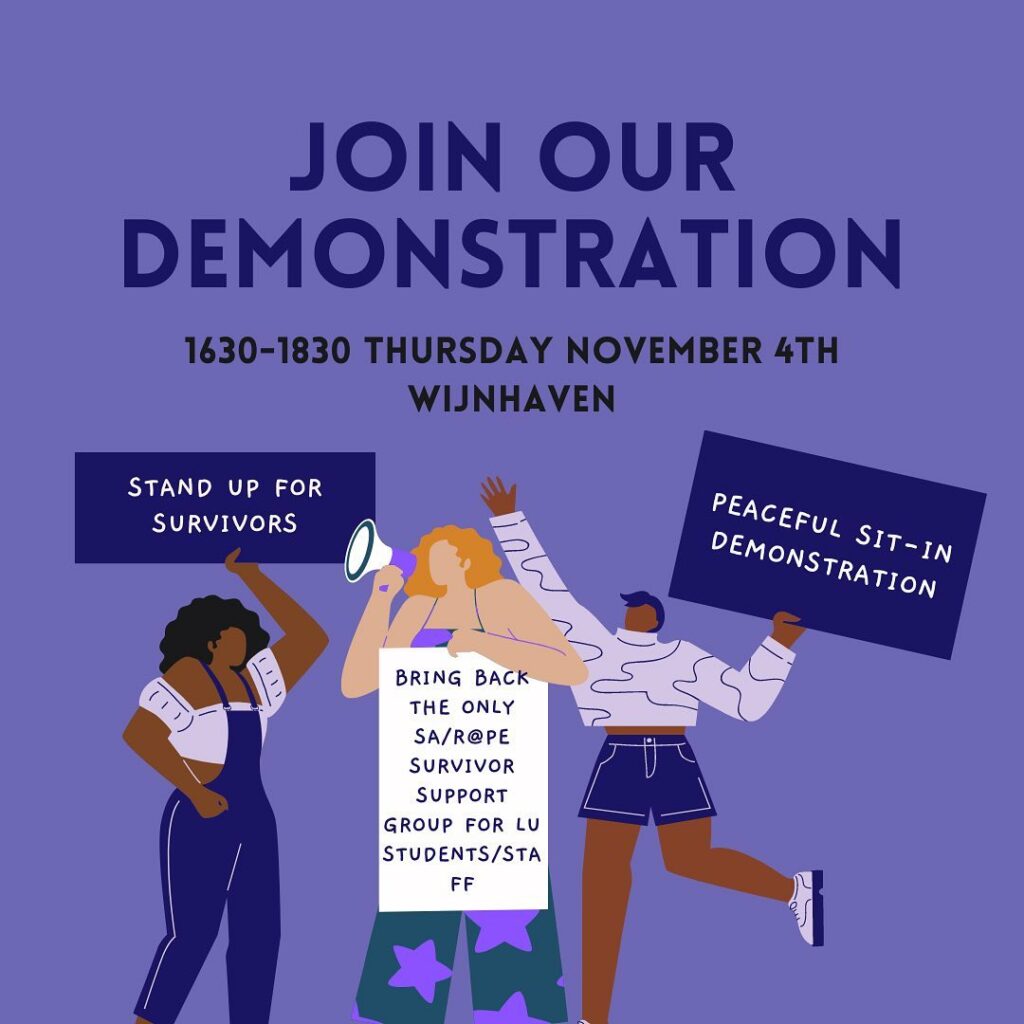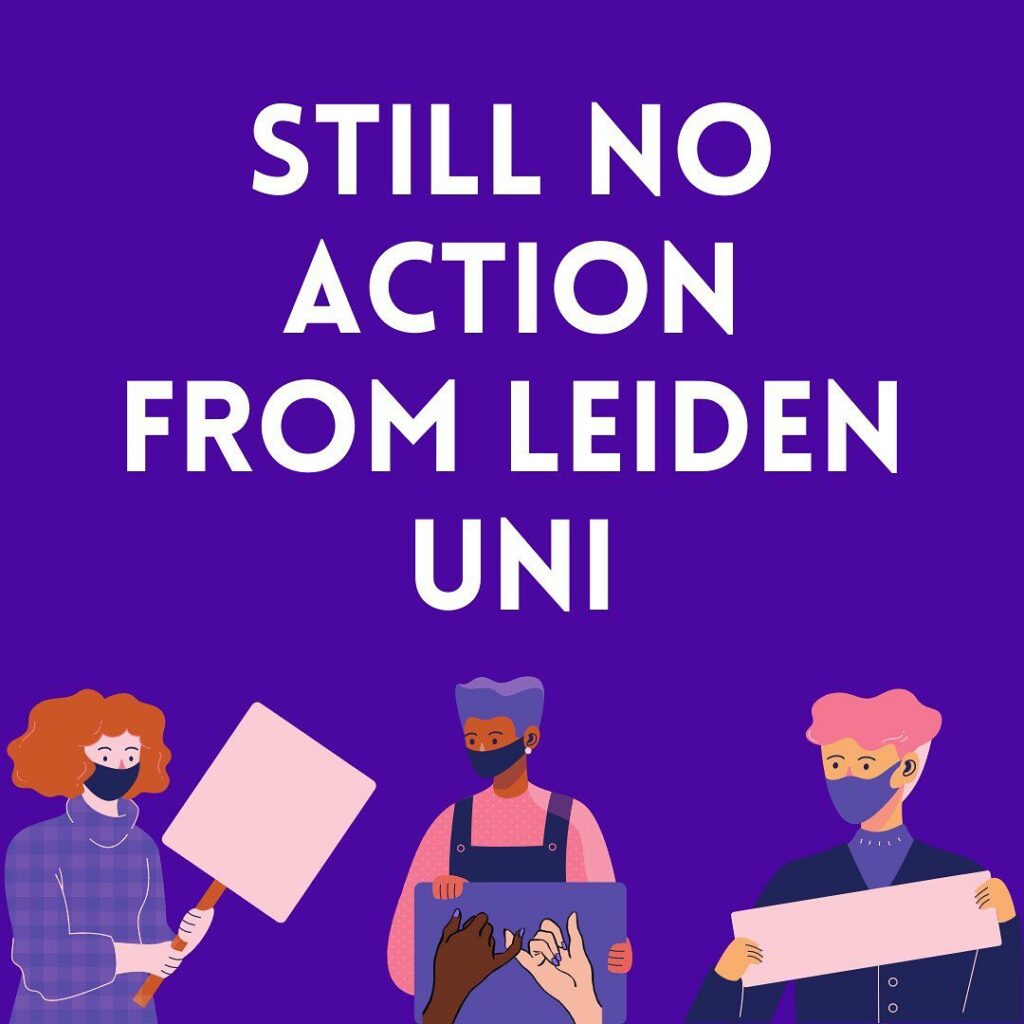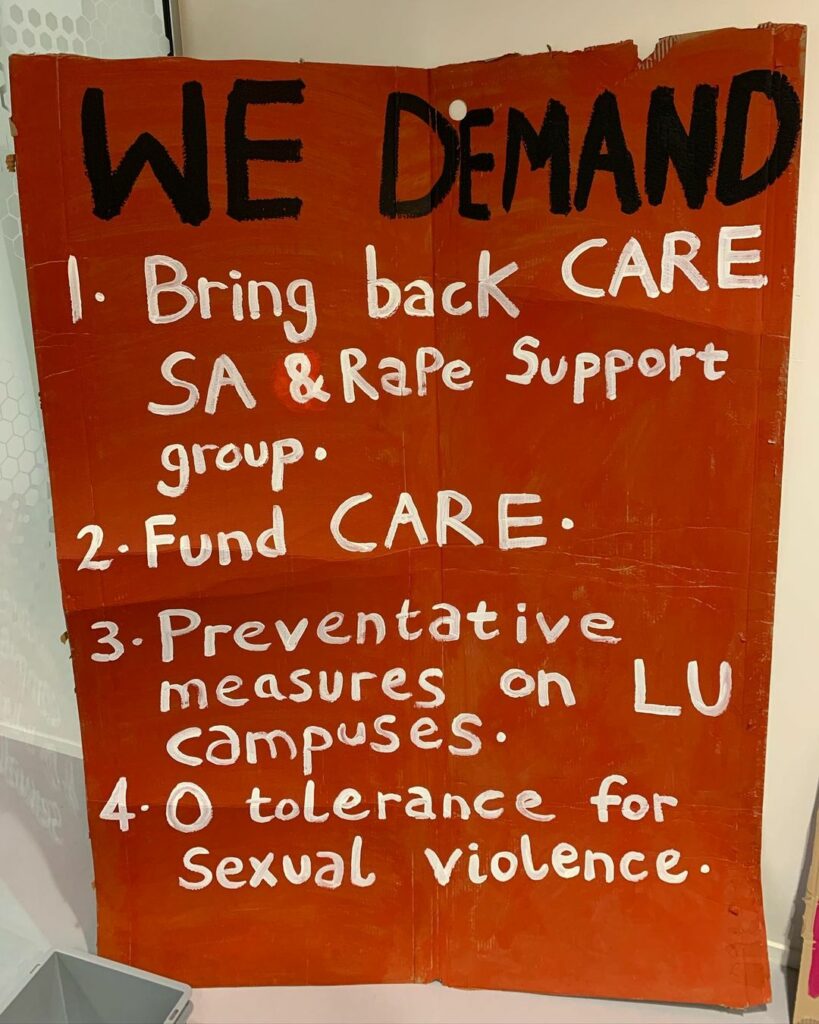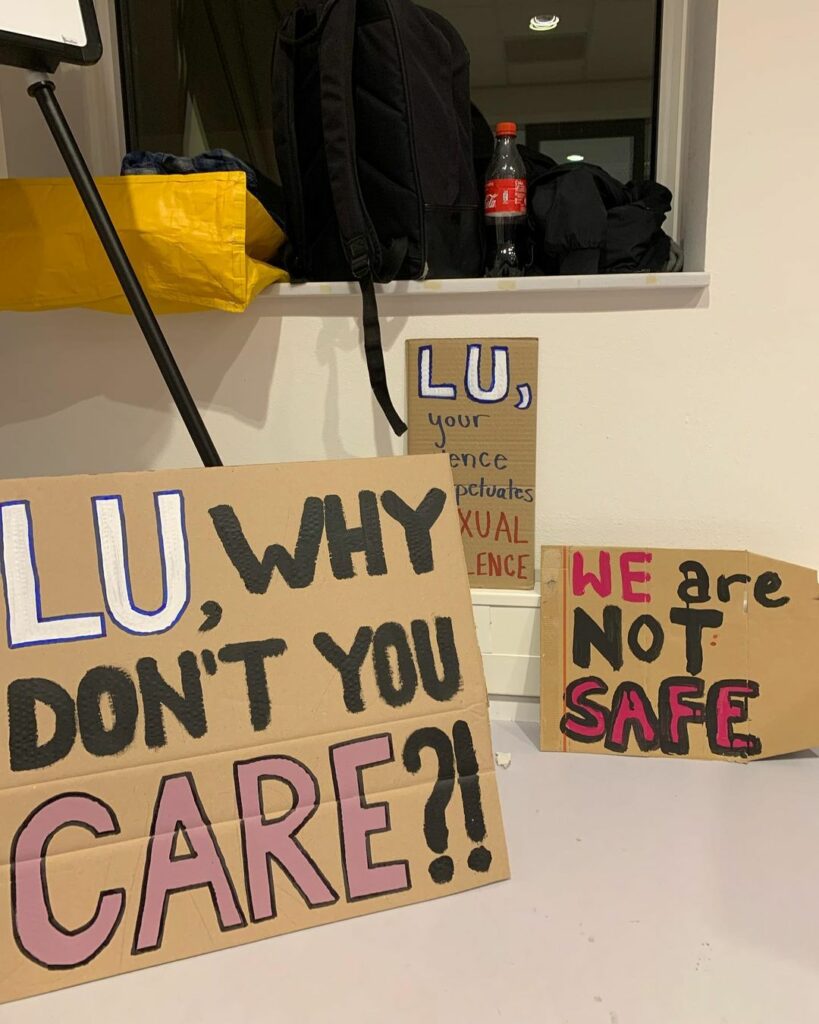4 november, Den Haag: sit-in for more sexual assault/rape survivor support and sexual violence prevention campaigns at Leiden University

“In 2020, Leiden University set up a support group for survivors of sexual assault and rape. The group is called CARE and offered survivors a community and a safe space supported by psychologists. The University administration has now decided to cut the group’s funding”, writes A Survivor at Leiden Uni. “I have written an open letter to the University, in order to: 1. Explain why CARE is needed, 2. Urge the university to continue funding CARE, 3. Advocate for the voiceless, 4. Express my pain, 5. Draw attention to the wider societal issues victims/survivors face. I want the University to do more to support survivors as well as help prevent sexual assaults from occurring.” That was some three months ago, and nothing happened.
Also a petition was held, which was signed 5.200 times. And now a “peaceful, sit-in demonstration” will be organised “advocating for more sexual assault/rape survivor support and sexual violence prevention campaigns at Leiden University.”
More information at Instagram at a.survivor.at.leiden (that also where the pictures are from)
Thursday 4th November
From 16:30 to 18:30 hrs
Wijnhaven, Den Haag
Here’s the open letter (trigger warning: sexual assault, rape).
“Sunday 4th July, 2021, Den Haag, the Netherlands
Dear Leiden University,
At the age of seven, I was raped for the first time. This continued for years. I was raped so many times that by the time I was eight I’d lost count. In the summer of 2020 I was sexually assaulted on Leiden University campus. Last year, Leiden University set up a support group for victims of sexual assault, and the administration has now decided to cut the group’s funding.
Mundane things like riding a bike, washing myself in the shower and having friends hug me unexpectedly have disturbed me on a daily basis for many years. However, it was only last summer that I came to realise that I was in desperate need of professional help. After a few weeks of hunting for psychologists and being added to waiting lists, I stumbled across an Instagram post advertising for a support group for sexual assault victims. The group is called CARE, and was created upon the initiative of Leiden University in 2020.
I joined CARE in September; apprehensive at first. I was ashamed, terrified, haunted and anxious about acknowledging the trauma that haunted me to myself, let alone to a group of strangers. The first few sessions in particular were triggering for me – but also healing. For the first time since I was a little, seven-year-old girl, I felt heard. I felt understood and empathised with on a level which non-victims cannot replicate. I felt safe and was able to trust. And, for the first time in my life, I did not feel crazy sharing my story.
CARE’s weekly sessions were what got me through the first semester of this academic year. Whilst Leiden does have student counsellors and psychologists, a support group offers a unique type of help. Seeing the friendly faces of the women who had suffered similar experiences to me gave me a sense of community and hope that I had never had before. Some of those women are now my closest friends, who I know I can trust no matter what. If I’m having a flashback or a nightmare, I know I can rely on them and on the CARE psychologists. In the words of Leiden University’s Inclusion Blog: “support groups… offer safe spaces in which participants can speak openly about their experience under supervision of licensed psychologists. This contributes to the individual healing process and it creates an opportunity for building a community in which the topic of sexual violence is de-stigmatized and in which survivors can support each other by sharing both struggles and coping mechanisms.” During CARE, we have spent hours together; vulnerable and petrified, opening up and sharing our stories, fears and coping mechanisms with each other in our safe space. Our safe space that Leiden University has now taken away from us.

CARE’s sessions were funded by the University this academic year. CARE needs funding because – given the nature of the topics discussed in the group – a psychological expert’s presence is needed. The two psychologists who set up the group are specialised in sexual trauma and have guided our sessions and helped create a safe environment. When one of us panics, or becomes angry or upset, the psychologists help us cope in a way that an untrained person does not have the capacity to do. The psychologists are essential to a group of acute trauma survivors. Our group cannot exist without them.
In November 2020, only a few weeks after CARE’s sessions had begun, the University cut our group’s funding. Instead of meeting once per week, we were only able to meet once per month. This created a sense of disjointedness and distance, and I felt isolated and let down at the feeling of having our group taken away from us.
During our June session, the psychologists announced that Leiden University has cut CARE’s funding entirely. Leiden University has decided to stop funding its only support group for victims/survivors of sexual assault.
The frustration, disgust, pain and hopelessness that I feel is inexpressible. The University has now let survivors down. CARE is the first time and space I have had to talk about my experiences and slowly heal from them. To have this suddenly ripped from our hands is insufferable. The University Administration has offered the participants an opportunity to talk with them in interviews: to give us a chance to explain why we feel we need the group. To me, this feels as if the Administration is asking us to help justify the spending of a cut of the University’s funds to help survivors of sexual assault, whilst rehashing the traumas for many of us. As a top research University, I expected Leiden to have some understanding that de facto pushing victims (that’s what it feels like) to advocate for our need for a support group is damaging to say but the least.

The University should know that many victims of sexual assault aren’t believed or listened to when they first tell their stories, and this contributes to the trauma we have to live with every single day. Leiden University’s Inclusion Blog writes that survivors “likely already experience a lot of shame, self-blame and low self-worth… They may be afraid that they will be judged or may have a feeling that their experience is not worth reporting or significant enough. Instead they end up feeling alone with their experiences which in the worst case may affect them for the rest of their life.” By cutting CARE’s funding, Leiden University is perpetuating the suffering we have to face. It feels as if you are saying that our issues are not worthy enough of your funds – which, by the way, are our fees.
What is a good enough reason to cut a sexual assault survivors support group? I doubt price is the issue – the group costs nothing in the bigger picture of the University’s funds. Perhaps money is being redirected to another cause, such as educating students not to sexually assault others. Whilst I wholeheartedly agree that prevention is an integral aspect to bettering society and the University, I think this should not come at the expense of CARE’s funding. Teaching prevention does not take away the damage that has already and will continue to be done: I have been raped, and a prevention campaign will not amend the past. Survivors’ trauma and pain will not disappear in light of funding for rape and assault education and prevention. This should be done as well as continuing the support group. Meanwhile, the demand is not an issue either – we have a regular group of women who join CARE’s sessions. And, even if the demand were to be from “just” one victim, that’s more than enough demand in my opinion. If the group can change just one person’s life and experience, that’s already more than enough reason to continue it. I strongly believe that even if there were no demand at all, it is still essential that Leiden University has this safe space open in case anyone should need it in the future.

On the 3rd of September 2020, RISE wrote an advertisement “on behalf of Leiden’s Diversity and Inclusion Expertise Office” for the “weekly” support group: “The goal is to get together as survivors in order to share experiences and coping mechanisms and to build a judgement-free community in which everyone feels save [sic]. The sessions will be guided by two licensed psychologists. If you are struggling with the consequences of sexual assault, please reach out! It is not your fault and you deserve support.”
We need support. You as a University said you would support us, and then took this support away. Your support now feels performative. You gave us hope, a safe space and a community and have now wrenched that hope from our hands. I urge you to do better: continue funding CARE and increase the support for prevention, education and healing campaigns.
To all the fellow survivors who read this letter, my heart breaks for you, too. Please know that you do all genuinely deserve proper support, and that none of this is your fault. CARE’s psychologists are advocating for our group to continue.
I was first raped at the age of seven. Now at the age of 20 I have to fight for a safe space at Leiden University to heal from my trauma.
Yours faithfully,
Anon
CARE Leiden attendee and student at Leiden University”
Eric Krebbers
